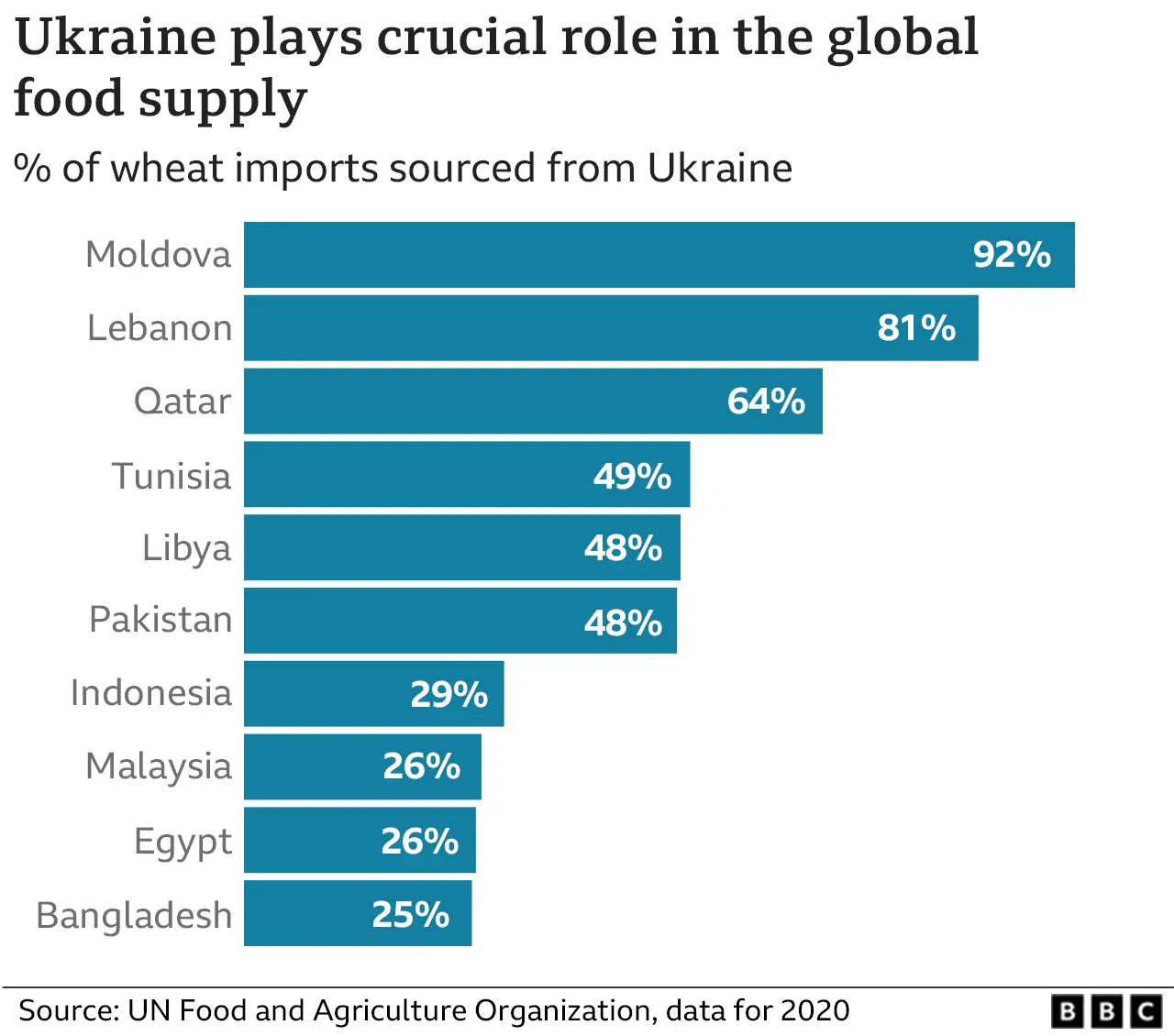Ukraine war: First grain ship leaves under Russia deal
The first ship carrying grain has left a Ukrainian port under a landmark deal with Russia.
Turkish and Ukrainian officials say the ship left the southern port of Odesa early on Monday morning local time.
Russia has been blockading Ukrainian ports since February, but the two sides made a deal to resume shipments.
It is hoped the agreement will ease the global food crisis and lower the price of grain.
Turkey said the Sierra Leone-flagged vessel, the Razoni, would dock at the port of Tripoli in Lebanon, adding that further shipments were planned over the coming weeks.
The Joint Co-ordination Centre, set up in Istanbul under the deal, said the ship was carrying some 26,000 tonnes of corn and was expected to arrive in Turkish waters for inspection on Tuesday.
Ukraine's Minister of Infrastructure Oleksandr Kubrakov told the BBC the Razoni was an important test to show the deal would work, with Turkey aiding its safe navigation through dangerous waters.
"There's the question of mines," he told BBC Newshour. "There are a lot of mines - starting from World War Two, in addition to mines which appeared in the Black Sea starting from February - it provides a lot of risks," he said.
There are concerns that while ships may be able to leave Ukraine with tonnes of grain, they might not be able to get affordable insurance to return for another load.
But Mr Kubrakov said he expected to see between one and three vessels going in both directions in the next few weeks, with empty ships coming to the port of Odessa from Turkey's Bosporus Strait.
While the sight of the Razoni, with her stowed white cranes and long blue hull, inching out into the mine-infested Black Sea represents a significant development, the operation will have to last for a sustained period for either Ukraine's damaged economy or tens of millions of people around the world to benefit.

Last month's deal - brokered by the UN and Turkey - took two months to reach and was set to last 120 days. It can be renewed if both parties agree. UN Secretary General António Guterres welcomed the departure of the ship and hailed Turkey for its role in working to implement the agreement.
The blockade of Ukraine's grain has contributed to a global food crisis with wheat-based products like bread and pasta becoming more expensive, and cooking oils and fertiliser also increasing in price.
Russia and Ukraine jointly produce nearly a third of global wheat supplies. In 2019 Ukraine accounted for 16% of the world's corn supplies and 42% of sunflower oil, according to UN data.
Ukraine's Foreign Minister Dmytro Kuleba called the shipment a "relief for the world" and urged Moscow to "respect its part of the deal". Kremlin spokesperson Dmitry Peskov told reporters in Moscow that the ship's departure was a "very positive" development.
International leaders gave the shipment a cautious welcome, with UK Foreign Secretary Liz Truss calling it "an important first step". But EU spokesperson Peter Stano said Russia must ensure the "whole deal" is met to resume Ukrainian exports around the world.
Under the terms of the deal, Russia has agreed not to target ports while shipments are in transit and Ukraine has agreed that its naval vessels will guide cargo ships through waters that have been mined.
One engineer working on the Razoni told Reuters news agency that he was worried about the danger of sea mines.
"We hope that nothing will happen and that we will not commit any mistake. This is the only thing that I fear during this trip, as for the other things, we are used to them as sailors," Abdullah Jendi said.
Turkey - supported by the United Nations - will inspect ships, to allay Russian fears of weapons smuggling.
Trust remains low between officials in Kyiv and Moscow, and last month the deal was thrown into chaos less than 24 hours after it was announced when Russia launched two missiles at Odesa port.
Odesa MP Oleksiy Goncharenko told the BBC he expected shipments to continue from the other ports on Tuesday but warned Russia might attempt to disrupt them with further military action.
"We see these awful missile attacks against Odesa in the last days - that is just their attempts to increase the risks for ship owners, for crew, not to come to Odesa," he said.


War in Ukraine: More coverage
- ON THE GROUND: Ukraine's shadow army
- WATCH: Kyiv apartment residents hope to rebuild
- ANALYSIS: Can the world cope without Russian oil and gas?
- READ MORE: Full coverage of the crisis

